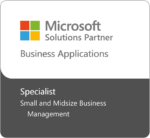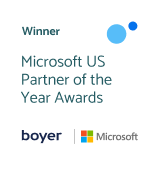
Enhanced Productivity with AI Assistance

Leading the Way in Digital Transformation
MSP 101: Your Definitive Source for Microsoft Managed Services
Maximize business efficiency through Microsoft Managed Services expertise


What Is a MSP or Managed Service Provider?
A Managed Service Provider (MSP) remotely manages Microsoft business applications, typically on a proactive basis and under a subscription model. The MSP model has evolved from earlier iterations of IT service delivery, such as break/fix services. In contrast to traditional reactive IT support, MSPs take a holistic and proactive approach to managing software.
This model allows businesses to offload software capabilities to the MSP, thus freeing up their internal resources for core business activities. MSPs bring a level of expertise and experience in handling a variety of needs, ensuring that Microsoft systems are reliable, up-to-date, and secure.
For a more comprehensive understanding of MSPs, including their role in modern business, types of services offered, benefits, challenges, and best practices for selecting and working with a MSP, visit our detailed guide, “What Is MSP? Complete Guide to Mastering Managed Service Providers.”
The Benefits of Working With a MSP Partner

Leverage Partner Expertise to Expand Resources
- Working with a Managed Service Provider (MSP) offers several significant benefits for businesses of all sizes. Firstly, MSPs provide expertise and resources that many businesses may not have in-house. By partnering with a MSP, companies gain access to a team of Microsoft experts with a broad range of skills and experience. This expertise is crucial for maintaining, updating, and optimizing Microsoft business applications.

Achieve Cost Efficiency and Innovation
- Additionally, MSPs often have access to the latest technology and tools, ensuring that their clients benefit from the most current and effective operations. Another key advantage is cost efficiency. MSPs typically operate on a subscription-based model, which means businesses can predict their software management costs more accurately and avoid the large capital expenditures that come with managing IT in-house.

Discover the Strategic Value of MSP Partnerships
- For a deeper dive into the advantages of collaborating with a MSP, visit our comprehensive guide. This resource offers extensive insights into the strategic value that MSP partnerships can bring to your business, helping you to make informed decisions about your IT strategy. Whether migrating from QuickBooks to Microsoft business applications or setting up structured operations for a nonprofit organization, Boyer & Associates can help.
Non-Profit Managed Service Providers
Non-profit Managed Service Providers (MSPs) specialize in catering to the unique needs of non-profit organizations, offering tailored IT services that align with the specific challenges and budget constraints these entities often face. These MSPs understand that non-profits operate under different dynamics than for-profit businesses, including limited resources, heavy reliance on donor funding, and a strong focus on mission-driven goals.
One of the primary benefits of partnering with a non-profit MSP is the ability to leverage technology to advance an organization’s mission. These MSPs optimize Microsoft business applications for cloud computing, data management, and cybersecurity, all crucial for the efficient and secure operation of any non-profit. Learn about Broken and Beautiful, a nonprofit organization that benefits from Boyer’s managed services.
For an in-depth exploration of how a non-profit MSP can enhance your organization’s capabilities, visit our guide to digital strategies for nonprofits. This resource provides valuable insights into leveraging technology for greater impact in the non-profit sector.
Non-Profit Managed Service Providers

Cloud Managed Service Providers

Cloud Managed Service Providers
Cloud Managed Service Providers (MSPs) are specialized in managing and supporting cloud services and infrastructure for businesses. These providers play a critical role in helping organizations navigate the complexities of cloud computing, ensuring that businesses can effectively leverage the power of the cloud for their specific needs.
Cloud MSPs offer a range of services, including optimizing Microsoft business applications for cloud infrastructure management, cloud security, backup and disaster recovery, and compliance support. By handling these aspects, they allow businesses to focus on their core operations without the need to develop in-house expertise in cloud technology. Finding the right cloud MSP is essential to finding success.
Furthermore, to understand how a Cloud MSP can future-proof your organization’s cloud strategy, check out our comprehensive article on the topic. This in-depth guide explores how partnering with a Cloud MSP can enhance your cloud capabilities, ensuring you stay competitive in the industry.
Managed Services and Microsoft Business Applications
Managed Service Providers (MSPs) play a pivotal role in helping businesses effectively utilize Microsoft business applications, which encompass a wide range of productivity, communication, and business process tools. These applications, including Microsoft 365, Dynamics 365, and Power Platform, are crucial for modern business operations, offering solutions for everything from email and collaboration to CRM and business analytics.
MSPs specialize in customizing, deploying, and managing these applications to align with the specific needs of a business, ensuring that organizations get the most out of their Microsoft software investments. MSPs assist in integrating these applications with existing systems, ensuring seamless operation and data flow across various business functions. Boyer worked with the American Foundation for the Blind to set up automated systems for their nonprofit using Microsoft business applications.
For a more detailed exploration of how MSPs can revolutionize your use of Microsoft business applications, read our guide on the topic. Whether you are looking to improve collaboration, streamline operations, or enhance customer engagement, this guide will help you understand the strategic value MSPs can bring to your Microsoft application suite.
Managed Services and Microsoft Business Applications
Working with MSPs and Microsoft Dynamics 365

Working with MSPs and Microsoft Dynamics 365
Working with a Managed Service Provider (MSP) can significantly enhance the effectiveness and efficiency of using Microsoft Dynamics 365 in your business. Dynamics 365, a suite of enterprise resource planning (ERP) and customer relationship management (CRM) applications, offers powerful tools for managing business processes. However, these systems can be complex and require expert knowledge to configure and maintain optimally.
This is where a MSP becomes invaluable. By providing specialized expertise in Dynamics 365, MSPs ensure that the platform is tailored to fit the unique processes and needs of a business. Their continuous monitoring and management services also mean businesses can expect proactive solutions to potential issues, ensuring minimal downtime and business continuity. This level of support is particularly beneficial for companies that lack in-house expertise in managing complex ERP and CRM systems.
Learn how Dynamics 365 can transform your business operations and the role of MSPs in our blog. This resource provides comprehensive insights into leveraging Dynamics 365’s full suite of applications. And discover the benefits of using a MSP for migrating from QuickBooks to Microsoft business applications. Boyer details a case study of a client who found success doing just that.
Navigating Managed Services Agreements
Managed Services Agreements (MSAs) and Service Level Agreements (SLAs) are fundamental components when engaging with a Managed Service Provider (MSP). These agreements form the legal and operational framework of the partnership, outlining the services to be provided, performance standards, responsibilities of each party, and the metrics for measuring service effectiveness.
An MSA typically encompasses aspects like the scope of services, terms and conditions, pricing models, data protection policies, and dispute resolution mechanisms. It sets the foundation for the business relationship, clarifying what the MSP will deliver and the expectations from the client’s side. For example, Plunkett’s Pest Control entered a contract with Boyer to improve their operations using Power Apps.
For a deeper understanding of how to navigate Managed Services Agreements and what to expect when hiring a MSP, visit Managed Services Agreement: Understanding Expectations When Hiring A MSP.
Navigating Managed Services Agreements

Choosing and Hiring a MSP for Your Business

Choosing and Hiring a MSP for Your Business
When selecting a MSP, it’s important to consider factors such as their expertise in your specific industry, the range of services they offer, and their track record in managing Microsoft business applications. It’s also essential to assess how well their service level agreements (SLAs) align with your business needs and whether they can offer scalable solutions as your business grows. A good MSP should act as a partner, not just a service provider, offering strategic guidance to help your business leverage technology for growth and efficiency.
A common misconception in choosing a MSP is the need for them to be geographically close to your business. While local support can be beneficial, it’s often more important to focus on the provider’s expertise and ability to deliver services remotely. Keep in mind that most issues can be resolved remotely, and a focus on proximity can limit your options unnecessarily. For more insights on this aspect, visit “Why Requiring a ‘Managed Services Provider Near Me’ Can Be a Bad Decision‘
Footer
Join Our Newsletter
"*" indicates required fields





